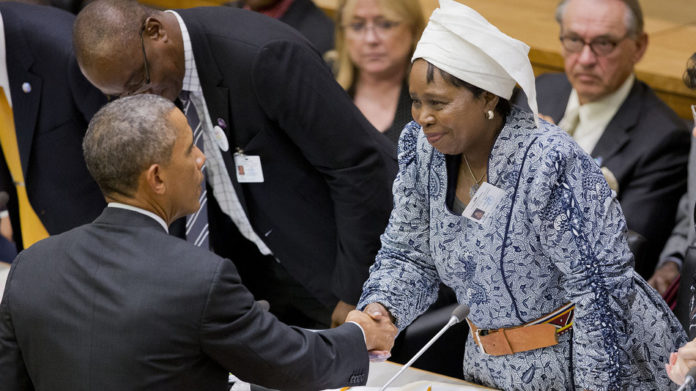At U.N., Obama Warns Leaders to ‘Sprint’ Into Gear to Fight Ebola Outbreak

President Obama delivered a stark warning to world leaders that there is a high risk that the Ebola virus will continue to ravage West Africa unless more actions are taken soon to slow and stop the outbreak.
Speaking at a special high-level U.N. meeting on Thursday concerning the largest Ebola outbreak in history, Obama said that how the world responds in the next several weeks will make the difference between having 10,000 to 30,000 deaths in West Africa and up to a million fatalities from Ebola virus disease.
The illness, which causes high fever, diarrhea, internal bleeding and other symptoms, has already sickened more than 6,200 people in four nations, including 2,917 deaths, as of Sept. 21, according to figures released by the World Health Organization on Thursday.
“We are not moving fast enough,” Obama said. “We are not doing enough. Right now, everybody has the best of intentions, but people are not putting in the kinds of resources that are necessary to put a stop to this epidemic.”
Obama emphasized information from public health experts who have said that the longer the outbreak continues, the more difficult it becomes to control.
“We know from experience that the response to an outbreak of this magnitude has to be fast and it has to be sustained. It’s a marathon, but you have to run it like a sprint. And that’s only possible if everybody chips in, if every nation and every organization takes this seriously. Everybody here has to do more.”

In this photo taken on Wednesday, Sept. 24, 2014, healthcare workers load a man suspected of suffering from the Ebola virus onto an ambulance in Kenema, Sierra Leone.
Image: Tanya Bindra/Associated Press
Obama said that stopping the Ebola outbreak is in the interest of all countries, in part because of the risk that the virus could breed regional instability or even spread beyond West Africa. “… in an era where regional crises can quickly become global threats, stopping Ebola is in the interest of all of us,” he said.
In a new report released Thursday morning, the WHO said the ebola outbreak is still getting worse, despite statistics that seem to show a recent drop in the number of cases and deaths.
“The epidemic of EVD in West Africa is still increasing,” the WHO said.
WHO Director-General Margaret Chan told the dignitaries gathered at the meeting that the virus is still running well ahead of efforts to control it. “This is a fast-moving epidemic that got ahead of everyone from the start… and is still running ahead, jumping over” obstacles put in its way, she said.
As an example of the delayed response effort, data published by her agency has shown that the virus was spreading in Guinea for three months before it was detected.
“We need to act with speed and efficiency and in ways that deal this virus some heavy blows,” Chan said.
The U.S. has mobilized personnel from the Centers for Disease Control and Prevention (CDC) and established a military command in Liberia to support response efforts in West Africa, and other nations including Cuba and China have also contributed aid.
However, Obama acknowledged these steps and others won’t be enough to gain the upper hand against a brutally efficient killer that has wiped out entire families and taken advantage of the high population density in the cities of Sierra Leone and Liberia in order to spread from one person to the next.
“I hope that I’m properly communicating a sense of urgency here,” Obama said. “Do not stand by, thinking that somehow, because of what we’ve done, that it’s taken care of. It’s not. And if we don’t take care of this now we are going to see fallout effects and secondary effects from this that will have ramifications for a long time, above and beyond the lives that will have been lost.”
According to the latest WHO data, the number of confirmed cases in Liberia appears to have fallen in the past week, but that is likely due to erroneous data. “It is likely that the figures will be revised upwards in due course,” the Ebola virus disease status report says.
The WHO says the situation in Sierra Leone also continues to “deteriorate,” largely driven by an increase in cases in the capital, Freetown.
The U.N. agency has said that failing to bring this outbreak under control soon could result in the disease becoming endemic in West Africa, which had not been contemplated before by public health officials.
The CDC meanwhile, released a study on Sept. 23 that projects the future spread of the deadly virus, after making assumptions for the number of cases and doubling rate for the number of infected persons. The study’s worst-case scenario projected up to 1.4 million people infected with the deadly virus by the end of January 2015, although there is a large amount of uncertainty in such projections.
According to the World Bank, such an outcome would be disastrous for the fragile economies in this region, costing nearly 12% of Liberia’s annual GDP, for example.
In an interview with Mashable on Sept. 22, World Bank Group President Jim Yong Kim said progress is being made in fighting the outbreak, but it remains to be seen if the international community can rein it in.
“This is gonna cost a lot, but it’s gonna cost way way more if we don’t respond immediately,” he said. “Right now, we’ve gotta move, because the outbreak is doubling every few weeks.”
